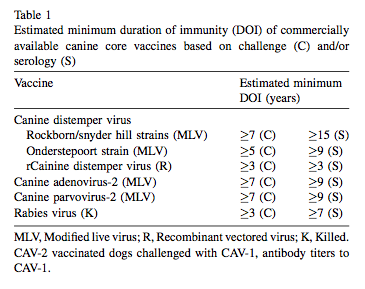Vaccinations Last At Least Three Years
![]() When reading Terrierman he made reference to the work Schultz has done on the duration of vaccines. Intrigued, I decided to read one of his articles. I dug up a review Shultz wrote on the duration of vaccines. It looks at available research on vaccines and their ‘duration of vaccinal immunity’ (i.e. how long they last).
When reading Terrierman he made reference to the work Schultz has done on the duration of vaccines. Intrigued, I decided to read one of his articles. I dug up a review Shultz wrote on the duration of vaccines. It looks at available research on vaccines and their ‘duration of vaccinal immunity’ (i.e. how long they last).
Whether a dog has immunity can be determined either by antibody titres (a ‘titre test’) or a challenge study (e.g. deliberately exposing the dogs to the pathogen).
For distemper, parvovirus, and adenovirus the published data suggests an immunity period of 3 years or longer minimum.
Using blood products to test immunity, it seems that vaccines last 3 years or longer. When using challenge studies, dogs that were vaccinated 11 years ago did not contract the virus.
According to this article, if a cat or dog is:
- Vaccinated with core vaccines at 12 weeks of age or older,
- Is revaccinated at 1 year old, and
- Receives a vaccination “not more often than every 3 years”
then this would be as protective to the pet as annual vaccination.
However, non-core vaccinations last a year or less.
Table 1 shows estimated minimum duration of immunity for the 4 core canine vaccines.

Shultz concludes, “Extending the revaccination intervals for canine and feline core vaccines does not place the animal at increased risk to developing vaccine preventable disease, but it does reduce the potential for adverse reactions”
He also recommends using titre tests to ensure that a puppy’s final vaccine enduces an immune response – and to revaccinate if the titre does not indicate that an immune response was produced.
Oh, and on cats? According to this paper, feline vaccines less researched, but feline parvovirus, calcivirus and herpes seems to last at least 7.5 years. Exception is feline leukemia which provides immunity for 1 year or less.
Reference:
Ronald D. Schultz (2006). Duration of immunity for canine and feline vaccines: A review Veterinary Microbiology, 117 (1), 75-79 DOI: 10.1016/j.vetmic.2006.04.013
